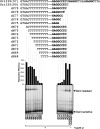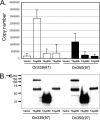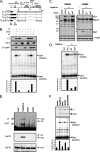The minimum replication origin of merkel cell polyomavirus has a unique large T-antigen loading architecture and requires small T-antigen expression for optimal replication
- PMID: 19759150
- PMCID: PMC2786723
- DOI: 10.1128/JVI.01336-09
The minimum replication origin of merkel cell polyomavirus has a unique large T-antigen loading architecture and requires small T-antigen expression for optimal replication
Abstract
Merkel cell polyomavirus (MCV) is a recently discovered human polyomavirus causing the majority of human Merkel cell carcinomas. We mapped a 71-bp minimal MCV replication core origin sufficient for initiating eukaryotic DNA replication in the presence of wild-type MCV large T protein (LT). The origin includes a poly(T)-rich tract and eight variably oriented, GAGGC-like pentanucleotide sequences (PS) that serve as LT recognition sites. Mutation analysis shows that only four of the eight PS are required for origin replication. A single point mutation in one origin PS from a naturally occurring, tumor-derived virus reduces LT assembly on the origin and eliminates viral DNA replication. Tumor-derived LT having mutations truncating either the origin-binding domain or the helicase domain also prevent LT-origin assembly. Optimal MCV replication requires coexpression of MCV small T protein (sT), together with LT. An intact DnaJ domain on the LT is required for replication but is dispensable on the sT. In contrast, PP2A targeting by sT is required for enhanced replication. The MCV origin provides a novel model for eukaryotic replication from a defined DNA element and illustrates the selective pressure within tumors to abrogate independent MCV replication.
Figures







References
-
- Benbow, R. M., J. Zhao, and D. D. Larson. 1992. On the nature of origins of DNA replication in eukaryotes. Bioessays 14:661-670. - PubMed
-
- Campbell, K. S., K. P. Mullane, I. A. Aksoy, H. Stubdal, J. Zalvide, J. M. Pipas, P. A. Silver, T. M. Roberts, B. S. Schaffhausen, and J. A. DeCaprio. 1997. DnaJ/hsp40 chaperone domain of SV40 large T antigen promotes efficient viral DNA replication. Genes Dev. 11:1098-1110. - PubMed
Publication types
MeSH terms
Substances
Grants and funding
LinkOut - more resources
Full Text Sources

